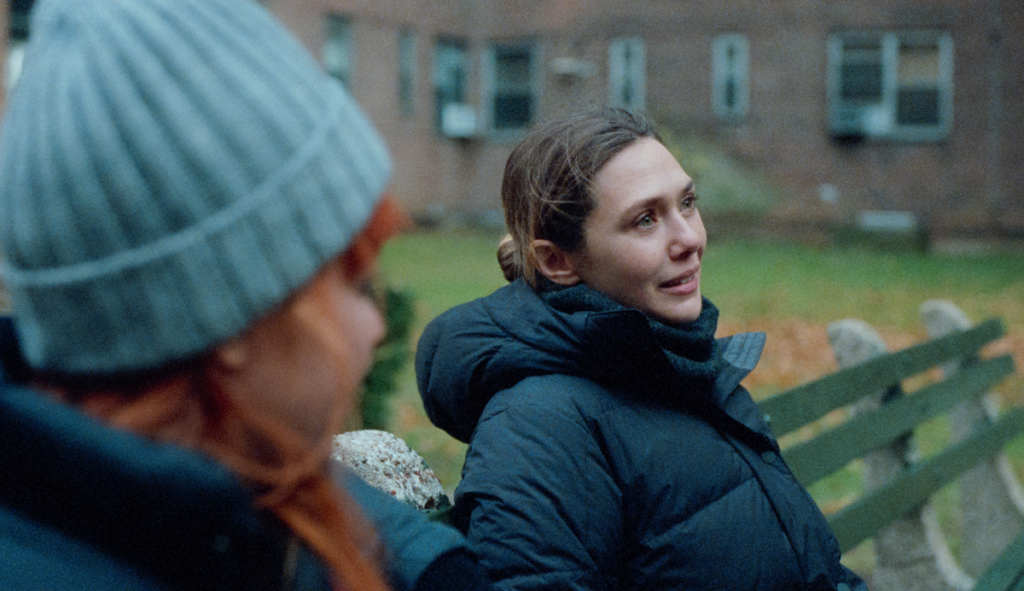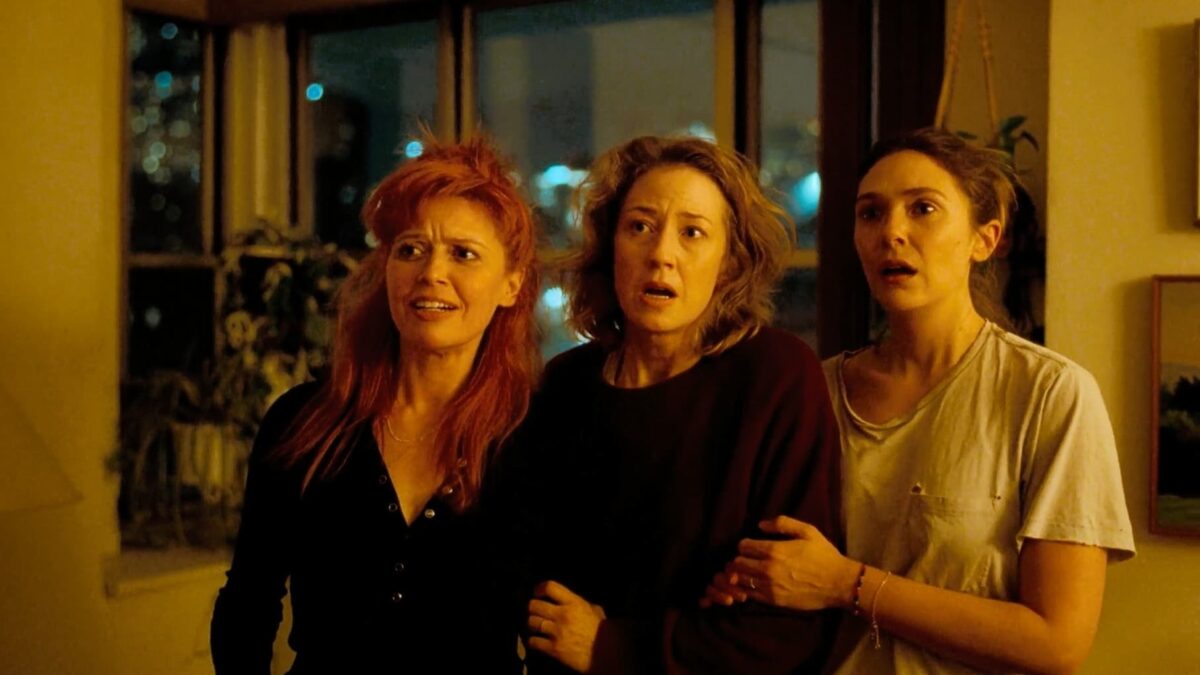Father duck said beep beep beep beeep
You must be patient with His Three Daughters. It puts its worst foot forward: Its three wonderful actresses give wildly divergent performances for the three broadly drawn sisters: Katie (Carrie Coon), the bossy and judgmental one; Christina (Elizabeth Olsen), the chipper and maternal one; and Rachel (Natasha Lyonne), the irresponsible pothead one. We meet them with first-year-MFA-level-written introductions. If not for the cast and reputation of director-writer Azazel Jacobs as an excellent dramatist and character writer, I honestly might have bailed.
The sisters converge at their father Vincent’s (Jay O. Sanders) New York City apartment as he enters in-home hospice care. In other words, he’s on his deathbed. The first incident they face upon arrival is that Rachel, the burnout sister, forgot to get a doctor to approve a do-not-resuscitate order. It unfolds exactly as you’d expect with the given character types: the controlling Katie berating Rachel over the mistake as Christina tries to keep the peace with gentle aphorisms.

The film isn’t quite good by the end of this incident, although it’s getting there. It’s setting a baseline template: the sisters bickering over a heavy topic as if it were a missed item on a grocery list, unwilling to face the gravity of their situation head-on and in unison. These opening scenes also gives us a couple of motifs that will grow in power and/or strangeness over the film’s runtime: First is the ever-present beeping of Vincent’s heart-rate monitor. It’s a ticking time bomb and a grating reminder of the death in the room. Second is the occasional appearance of the strange hospice worker Angel (Rudy Galvan), whose name is an obvious joke. But the character himself is perhaps the most unique element in the story: Angel speaks with professional curtness, his meaning conveyed entirely in subtext and dark euphemisms. He becomes increasingly bold in encouraging the daughters to euthanize their fading father. He gives instructions on what to do after Vincent’s death with the same perfunctory, courteous cadence that someone at a hotel front desk would use to explain the steps for checking out the next morning.
Slowly, the film sinks its claws in. The screenplay picks up from its slow beginning, exploring the nuances of the three sisters and giving them each some contradictions and layers as they face the unfathomable loss of their last surviving parent. By far the most generous recipient of the writing is Lyonne’s Rachel, who is revealed to be more perceptive and caring and steady than her initial, withdrawn snapshot. We learn that her coldness towards her sisters is at least partially a byproduct of feeling ostracized by the others for being their dad’s daughter through marriage rather than birth. The latter detail is revealed in a marvelously offhanded way, when Katie is narrating a draft of Vincent’s obituary and includes Rachel as a footnote rather than as a surviving family member. (“Survived by his two daughters,” she writes, with the film’s title an unspoken denial of Rachel’s exclusion as a true daughter.)
Katie and Christina are also given some richer characterization, though it is pretty hit-or-miss. Jacobs tries hard to have both of their motherhoods serve as a reflection of Vincent’s complicated father figure, but my main takeaway is that Azazel is indeed not himself a mother and offers no particularly compelling color to that dimension of their characters. Katie is an alcoholic always on the edge of the wagon. The least convincing detail, though, is that Christina was herself a former deadhead burnout. I just can’t see it in Olsen’s take on Christina.

The film ends with a bold storytelling swing that I imagine will be divisive because it’s so perpendicular to anything else in the film. I liked it and was touched by its expression of love, but it didn’t have much knife-twist impact on me because I figured out what Jacobs was doing right away.
His Three Daughters is a film that rides on its acting and its writing. Coon, Olsen, and Lyonne all end up doing well, though I think Lyonne is best in show to accompany the most developed character. Her quiet grief stirred me a few times. (Seeing Coon in anything just makes me itchy to revisit The Leftovers.)
Even Jacobs acquits himself even in spite of the film’s slow start. It’s an engaging, well-sketched slice-of-life; thoughtful about loss but not alienating in its heaviness. Twenty-five years ago, this would be more attractively filmed and be a prominent piece Oscar-bait rather than a warm, low-budget, flat-looking streaming drop. But it’s a good film nonetheless.
Is It Good?
Good (5/8)
Dan is the founder and head critic of The Goods. Follow Dan on Letterboxd. Join the Discord for updates and discussion.


4 replies on “His Three Daughters (2024)”
In writing the screenplay, Azazel Jacobs had help from his two brothers, Typhon and Lucifer Morningstar (former by marriage, largely disliked, and nonetheless put in charge of dad’s end-of-life care).
I imagine this will clarify itself in the coming months, but what even is 2024’s Oscarbait? I feel like I’ve at least been dimly aware of Awards contenders earlier than this previously, but maybe I’m wrong and just speaking out my general grim feelings about the film year?
Given how successful streamers have been at the Oscars the past couple years, I guess movies like this actually are the new Oscarbait?
As far as conventional Oscarbait goes, though, Sing Sing is the most textbook example I’m aware of, and it’s a pretty good one I thought.
I’ve been very busy and fallen behind on reading your Friday and Nightmare weeks (kudos for the insane task of doubling up this fall) but looking forward to catching up when I get a few quiet minutes this week.
The title and the premise make me wonder if the movie does anything productive with the allusion to King Lear?
That’s a great thought that hadn’t occurred to me. There’s even some dispute about who gets the apartment when he dies! (So I actually haven’t seen or read King Lear so I can’t do a more detailed comparison…)